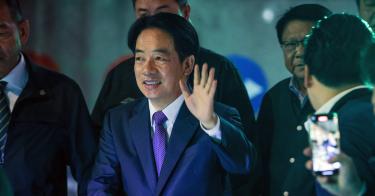In May, Taiwan will inaugurate a new president. Current vice president Lai Ching-te's victory in the January election met with strong approval in Washington, but many harbor concerns about the president-elect's history of pro-independence rhetoric.
While Taiwan functions as a sovereign entity separate from mainland China, its legal status is unsettled. Beijing claims the island as part of its territory and has repeatedly threatened to respond to any formal declaration of independence with military force, a scenario that could quickly spiral into a broader U.S.-China conflict. Avoiding this outcome should be a top priority for American policymakers.
Concerns about Lai's pro-independence proclivities are not unfounded. His election dampened hopes that cross-strait tensions could be eased in the coming years. Beijing deeply distrusts Lai and his Democratic Progressive Party (DPP) and will continue to use military, economic, and diplomatic pressure to constrain and delegitimize his leadership. China's military provocations will continue to destabilize the region, and the risk of escalation will remain ever-present.
But any fear that Lai might cause a war by declaring formal independence is overblown. He lacks both the will and the power to do so.
>>> What Taiwan’s Election Tells Us About China and 2024
Despite Lai's previous rhetoric, on the campaign trail the vice president repeatedly renounced formal independence, pledging instead to maintain his predecessor Tsai Ing-wen's moderate approach to China and preserve the status quo. His selection of Taiwan's former representative to the U.S., Hsiao Bi-khim—a noted moderate with deep ties to Tsai—as his vice president and his restrained rhetoric since being elected indicate he intends to keep this pledge.
In addition, a formal declaration of independence would be so unpopular with Taiwan's voters that it's hard to imagine any politician or party pursuing it. According to opinion polls, only 4.5 percent of Taiwan's public supports an imminent declaration of independence, while 88 percent support preserving the status quo, at least for now.
The DPP had a hard time recovering from the damage caused by the overtly pro-independence president Chen Shui-bian between 2000-2008. Neither it nor Lai are likely to sacrifice their political future to push an agenda almost no one wants.
Most importantly, in Taiwan's political system, the president lacks the authority to declare independence.
Formal independence would entail more than a statement asserting the island's sovereignty. It would require amending the constitution of the Republic of China (ROC, Taiwan's official name) either to establish an independent Republic of Taiwan or to codify the reality that the ROC no longer governs mainland China.
The process for amending the constitution or altering the ROC's territory was established in 2005, during Chen's presidency, to ensure no individual leader could unilaterally change the status quo.
Under these rules, any amendment must first be approved by a supermajority of three-quarters of the legislature, with at least three-quarters of its members participating in the vote. Given that every mainstream political party opposes changing the status quo, an amendment pushing formal independence would have little chance of clearing this hurdle.
Any amendment that does pass in the legislature must then be referred to the public through a referendum that must be approved by over 50 percent of all eligible voters—unrealistic levels of voter participation and public support.
For context, if the 72 percent of voters who participated in the latest presidential election all cast ballots, a whopping 70 percent of them would have to vote in favor of the amendment to constitute a majority of eligible voters. In practice, voter turnout for referendums is rarely much higher than 50 percent, meaning almost all votes would have to favor the amendment for it to pass.
>>> The U.S. Is Right to Support Taiwan’s Participation in International Organizations
The last attempt to pass a constitutional amendment on a separate issue—a 2022 proposal that sought to lower the minimum voting age from 20 to 18, and the minimum age for candidates from 23 to 18—cleared the high bar in the legislature but failed in the referendum stage. The 59 percent voter turnout meant the number of “yes” votes, despite constituting a majority, barely hit 30 percent of eligible voters.
If a relatively uncontroversial change like allowing 18-year-olds to vote couldn't pass, it would be nearly impossible for a referendum on independence to succeed, given the public's overwhelming preference for the status quo.
To be sure, Lai's presidency will bring challenges for cross-strait relations. Beijing loathes him and his party. He will have to conduct a delicate balancing act between placating the small but vocal group of pro-independence activists that constitute one of his key support bases and managing tensions with China, which will interpret everything he says and does as “salami slicing” aimed at gradually making formal independence a fait accompli. As a result, China's military provocations will likely further intensify while Lai is in office. That's far from ideal, but it's familiar territory for both Taipei and Washington.
On the potentially explosive issue of declaring independence, however, U.S. officials have no reason to worry. Their efforts will be best served working hand in hand with Taipei as both seek to preserve Taiwan's de facto sovereignty. This requires beefing up Taipei's defenses while also managing tensions with Beijing.
This piece originally appeared in Newsweek



